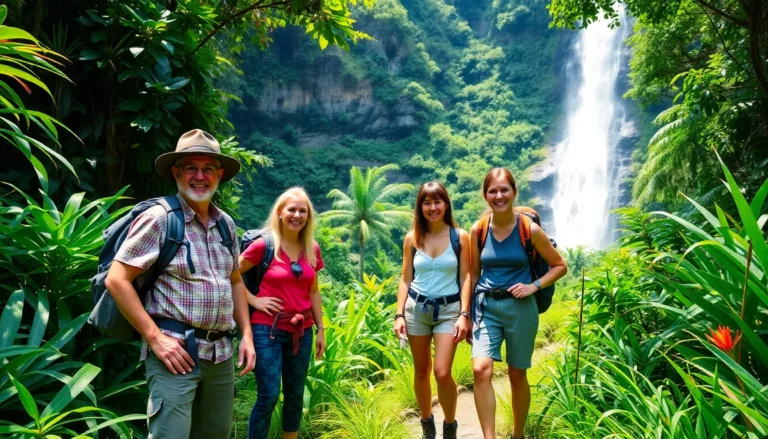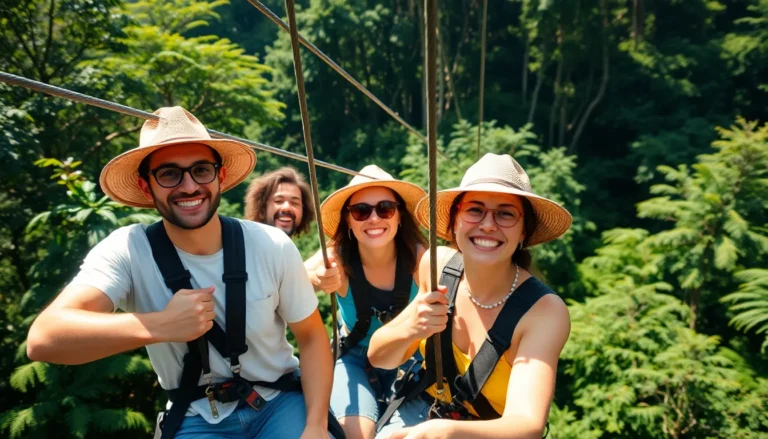Imagine trading your office cubicle for a lush rainforest or a serene beach where the only emails you’ll receive are from the waves crashing on the shore. Ecotourism isn’t just a trendy buzzword; it’s a passport to adventure that lets travelers explore the planet while keeping Mother Nature smiling. It’s about immersing oneself in breathtaking landscapes, encountering wildlife in their natural habitats, and leaving only footprints behind.
Ecotourism Places
Ecotourism places focus on sustainable travel experiences designed to conserve the environment and improve the well-being of local communities. These destinations often feature rich biodiversity, unique ecosystems, and stunning landscapes, drawing travelers who prioritize environmental stewardship.
Rainforests, deserts, mountains, and coastal areas commonly serve as ecotourism spots. In Costa Rica, for instance, ecotourism thrives due to its extensive national parks, such as Corcovado National Park, which protects critical habitats. Ecotours encourage visitors to appreciate nature while contributing to conservation efforts.
Wildlife sanctuaries and marine protected areas also provide exceptional opportunities for ecotourism. The Galápagos Islands showcase endemic species, allowing tourists to engage with wildlife in its natural habitat. Visitors play an active role in preserving these ecosystems by participating in educational programs.
Community-led initiatives represent a significant aspect of ecotourism. In various regions, local communities offer accommodations, guided tours, and cultural experiences. These interactions promote cultural exchange and benefit residents economically. For example, programs in Madagascar center on community-based ecotourism, enabling travelers to connect with local cultures and contribute to conservation.
Lastly, ecotourism places often promote low-impact activities. Hiking, birdwatching, and snorkeling highlight the beauty of nature while minimizing damage to ecosystems. Travelers encourage sustainable practices by choosing responsible tours and accommodations that follow eco-friendly guidelines.
Benefits of Ecotourism

Ecotourism offers numerous advantages, benefiting both the environment and local communities. Tourists engage in responsible travel that nurtures ecosystems while supporting cultural interactions.
Environmental Preservation
Ecotourism reduces the negative impact usually associated with traditional tourism. By prioritizing conservation efforts, travelers help protect endangered species and fragile habitats. Visitors frequently participate in activities that promote sustainability, like wildlife monitoring and habitat restoration. Locations like Costa Rica’s national parks thrive under ecotourism’s influence, maintaining their biodiversity. In addition, less invasive tourism reduces pollution and habitat destruction, allowing ecosystems to flourish. Nature preserves also benefit as funds generated from ecotourism often re-invested into conservation projects ensure these areas remain protected for future generations.
Cultural Exchange
Ecotourism encourages rich cultural interactions between travelers and local communities. Tourists often experience authentic cultural practices, from traditional crafts to local cuisine. Relationships built between visitors and residents promote cultural understanding and respect, which foster goodwill. Community-led tours often showcase indigenous traditions, allowing tourists to see local heritage firsthand. As a result, locals benefit from sustainable income, and visitors gain a deeper appreciation of regional cultures. These exchanges foster global awareness and contribute positively to the community’s social fabric, bridging gaps between diverse cultures.
Top Ecotourism Places Around the World
Ecotourism thrives in various locations that bolster environmental conservation and local cultures. These destinations showcase rich biodiversity and provide unique experiences.
Costa Rica
Costa Rica boasts a diverse landscape, including rainforests, volcanoes, and pristine beaches. National parks like Manuel Antonio and Corcovado serve as sanctuaries for wildlife. Visitors can engage in activities such as zip-lining through canopies, hiking trails, and observing exotic species. Local communities benefit from tourist dollars through eco-friendly lodges and guided tours that emphasize sustainability. This commitment fosters environmental protection and supports the livelihoods of residents.
New Zealand
New Zealand offers unique ecosystems, ranging from lush rainforests to geothermal fields. Popular spots like Fiordland National Park and Abel Tasman National Park attract nature lovers. Eco-tours deliver experiences such as kayaking in pristine waters and exploring the vibrant marine life along coastal trails. Sustainable practices are a priority, as many operators focus on conservation and cultural respect. The Maori culture enriches the experience, allowing visitors to connect with the land and its traditions.
Kenya
Kenya’s diverse wildlife and stunning landscapes make it a prime ecotourism destination. National parks like Maasai Mara and Amboseli showcase the incredible wildlife, including elephants and lions. Tourists can embark on responsible safaris, emphasizing conservation efforts while supporting local communities. Cultural encounters with the Maasai people offer insights into their traditions and lifestyle. This interaction highlights the importance of preserving wildlife habitats and ensuring sustainable tourism practices contribute to the local economy.
Tips for Responsible Ecotourism
Responsible ecotourism blends enjoyment with sustainability. Travelers play a crucial role in preserving ecosystems while exploring natural wonders.
Choosing Eco-Friendly Accommodations
Selecting eco-friendly accommodations minimizes environmental impact. Look for lodges and hotels that implement sustainable practices like solar energy and water conservation. Many establishments also prioritize local materials and support community initiatives. Research options that offer organic food sourced from nearby farms. These choices enhance guests’ experiences and contribute to local economies. Seek certifications from recognized environmental organizations, ensuring compliance with eco-friendly standards. Choosing such places fosters a commitment to conservation and showcases support for sustainable tourism.

Respecting Local Cultures
Respecting local cultures enhances ecotourism experiences. Engaging with local communities requires understanding their traditions and customs. Tourists should listen actively and learn about cultural practices through interactions with residents. Avoid imposing personal beliefs or disrupting local ceremonies. Participate in community-led workshops to gain deeper insights into local ways of life. Supporting artisan markets and local businesses further enriches cultural exchange while providing financial benefits. Demonstrating respect cultivates goodwill and allows tourists to appreciate rich cultural heritages fully.




